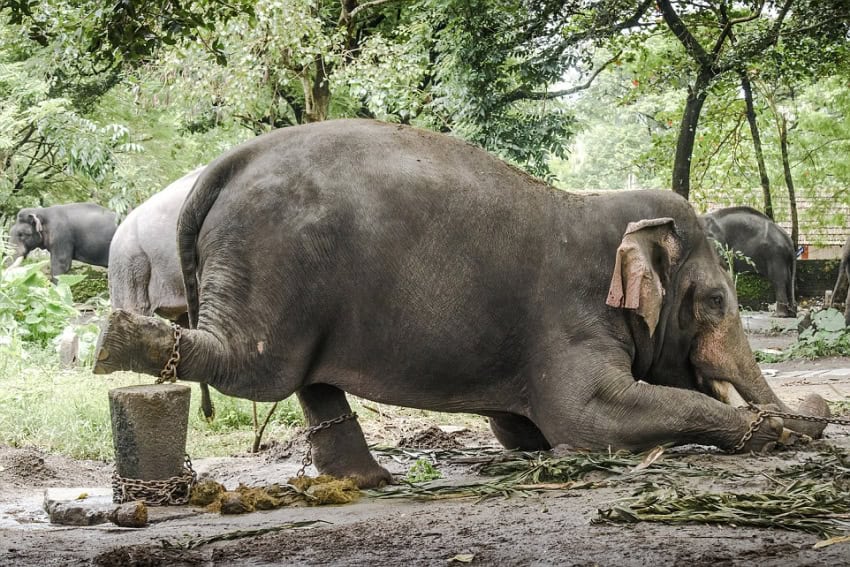THRISSUR (Web Desk) – Chained to the same spot for 20 years, these Asian elephants are being chained to tree stumps and beaten with metal sticks at temples in Kerala, southern India.
In Sunday edition of Daily Mail, Liz Jones shared the terrible plight of Indian elephants who are forced to spend months at secret ‘training’ camps where they are tortured before bringing at the temples.
Jones visited one such camp to investigate how the animals are treated.
57 elephants, studded around a patch of scrubby forest, begin to bellow and struggle against the chains that bind their hind feet to stumps and their front legs to a tree, cutting into their flesh. They cannot lie down. They cannot stretch out their hind legs. They cannot even reach the water butt, which is empty anyway.
Jones reached there with Duncan McNair, the London lawyer who founded the non-government organisation Save The Asian Elephants (STAE) in January, and Dr Nameer, a professor and Head of the Centre for Wildlife Studies in Kerala.
Prof Nameer translates what the mahout says: ‘He will be taught later.’ This means a beating with iron bars. This elephant, by the way, was a gift to the temple from Indian film star Suresh Gopi.
Another elephant, Vinayaka, is on his side, being hosed by his mahouts (most have two). It is a brutal, rough business. A stick is propped against one ear. The elephant’s eye is swivelling, desperate.
A mahout, Sudhakar told Jones a common practice was to insert a nail above the elephant’s toe. “The wound heals over. If the mahout wants total obedience, all he has to do is press that button,” he said.
At the entrance to the temple is Devi, who has been chained to this spot for 35 years. As a female, she is never taken to festivals, so has never, ever moved. Not one inch.
Prof Nameer has asked the temple leaders (politicians, businessmen) to allow the animals to be walked for one hour a day; they refused. He has drawn plans to build enclosures, but has received no response.
From October to May, an elephant will take part in 100 to 150 festivals. They will travel 3,720 miles in three months on a flat-bed truck. They are surrounded by thousands of people, noise, firecrackers.
They are routinely temporarily blinded, to make them wholly dependent on the mahout, and if in ‘musth’ (when males are ready to mate), they are given injections to suppress the hormones. Three elephants died due to these this year.
The second-best-known elephant in Kerala was paraded at Thrissur Pooram, an annual Hindu festival, where 84 elephants take part in elaborate costume. He was in musth, therefore unpredictable, so all of his feet were injured to render him immobile.
The only food given here is dry palm leaves. An elephant in the wild will eat a wide variety of grasses, fruit, leaves and vegetables. In the wild, an elephant will drink 140 to 200 litres of water a day. Here, they are lucky if they get five to ten.
It turns out there are vets on call. But an expert from the Centre for Wildlife Studies says: “They are not even qualified. They promote bad welfare to earn more money.”
Prof Nameer tried to bring in a Western vet to assess the elephants, but permission was refused.
Elephants are now big business. Each is worth £80,000, and can earn anything up to £5,000 an hour for appearing at festivals and weddings.
Jones also walked past baby elephants.
One of them was getting beaten with an ankush – a stick with a metal hook on the end; all the baby was doing was coming to say hello.
Only 25,000 wild elephants are now left in India (a collapse from more than a million in 1900) are in peril due to new developments announced by the government, which in turn means they will clash even more with farmers, and deemed ‘rogue’ or ‘problem’, which means they can be captured and trained.
There are almost 4,000 captive elephants, 80 per cent of which are in Kerala.




























